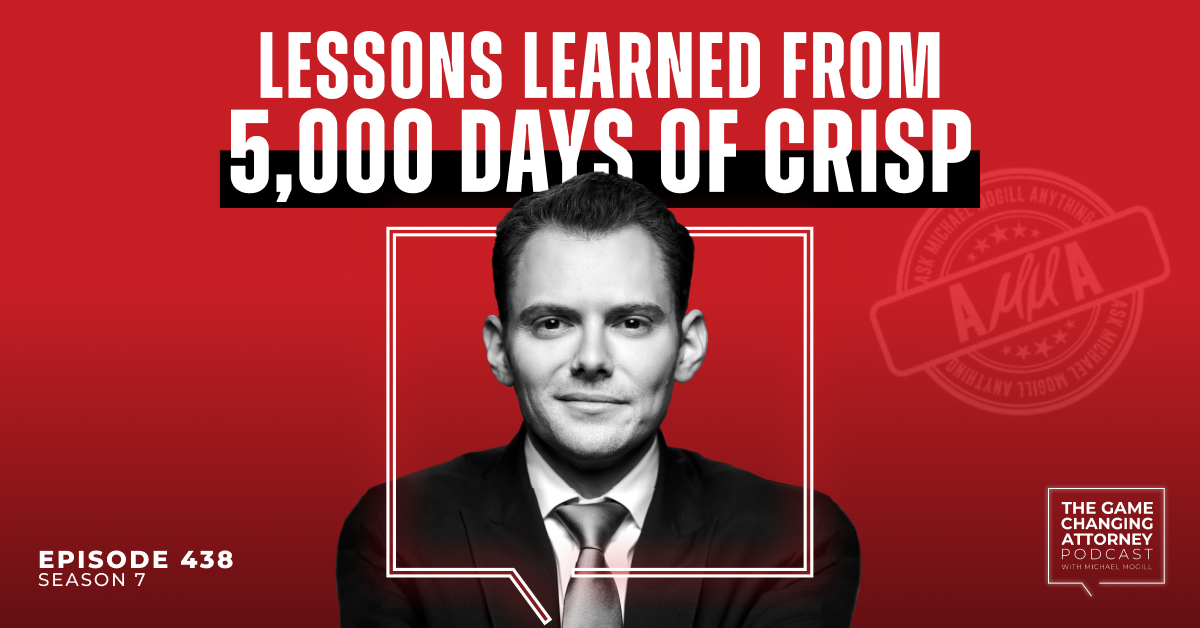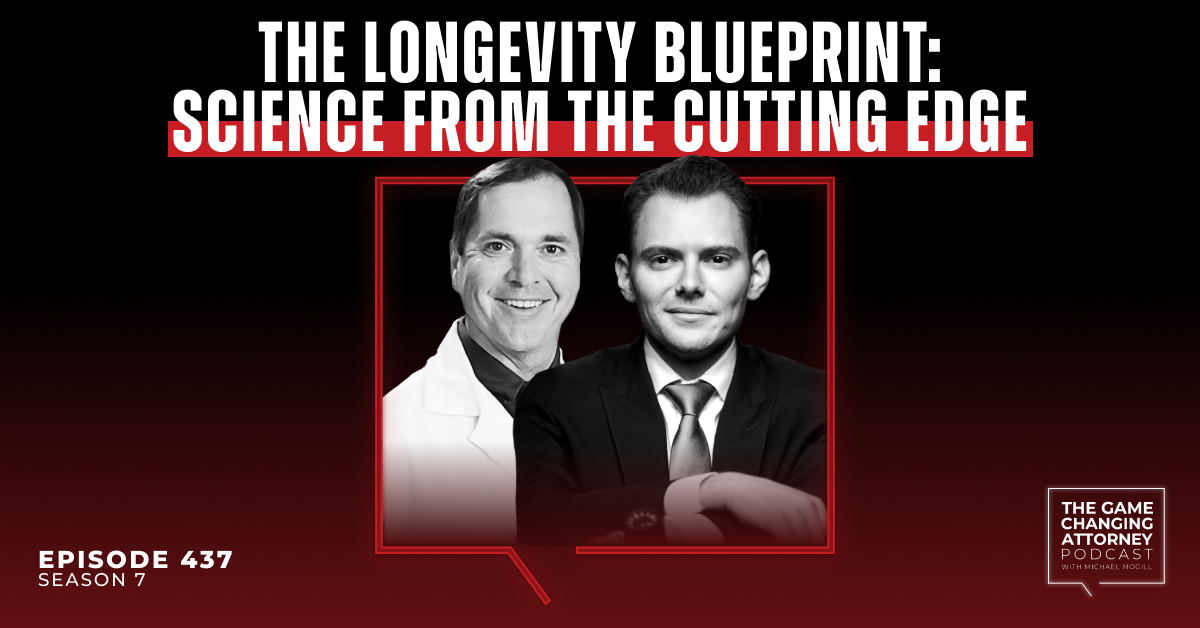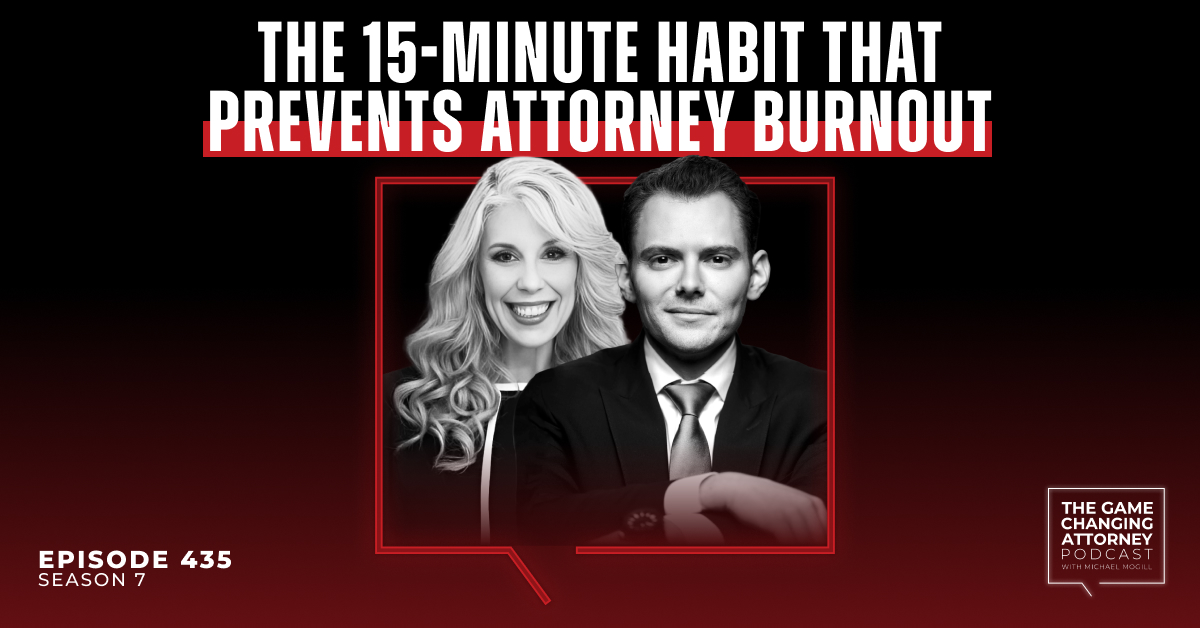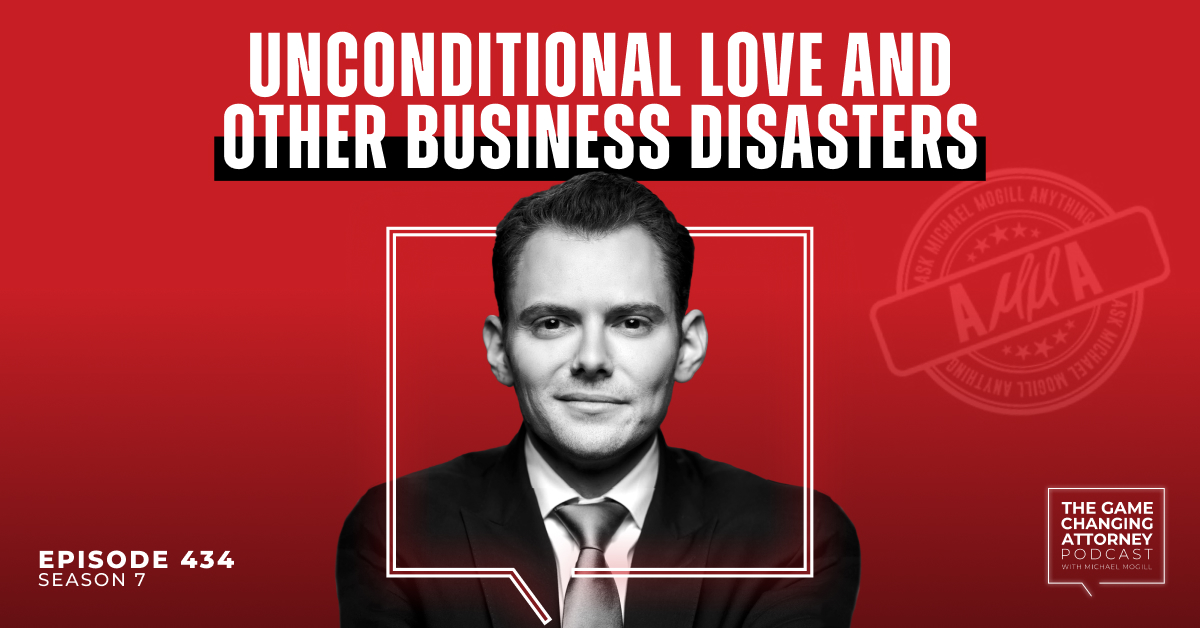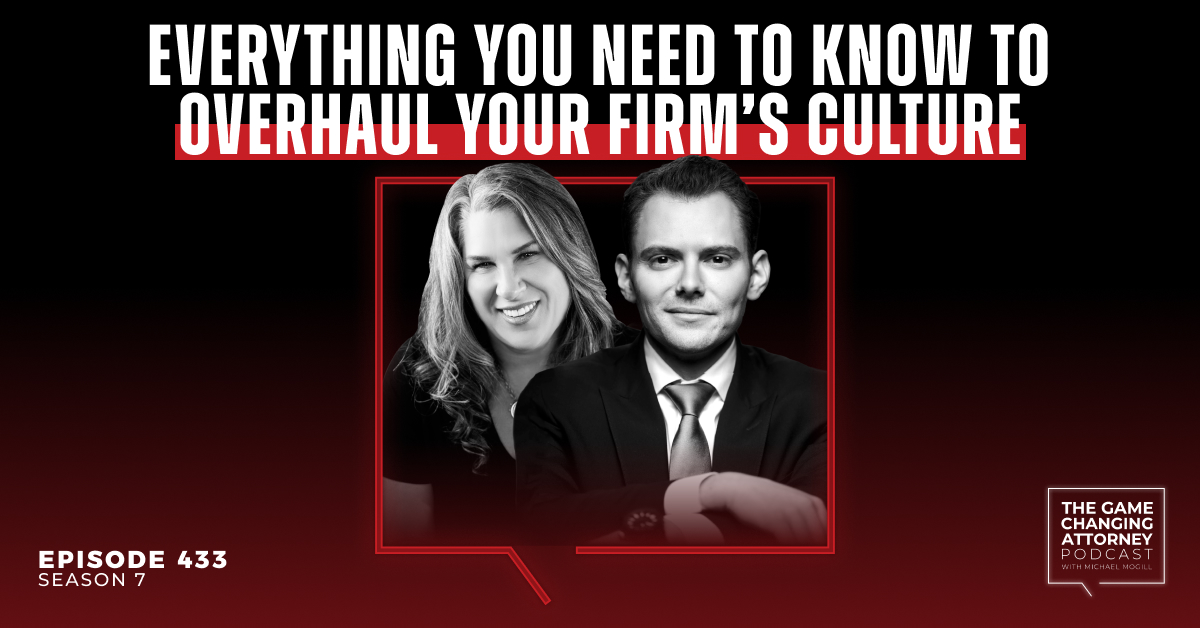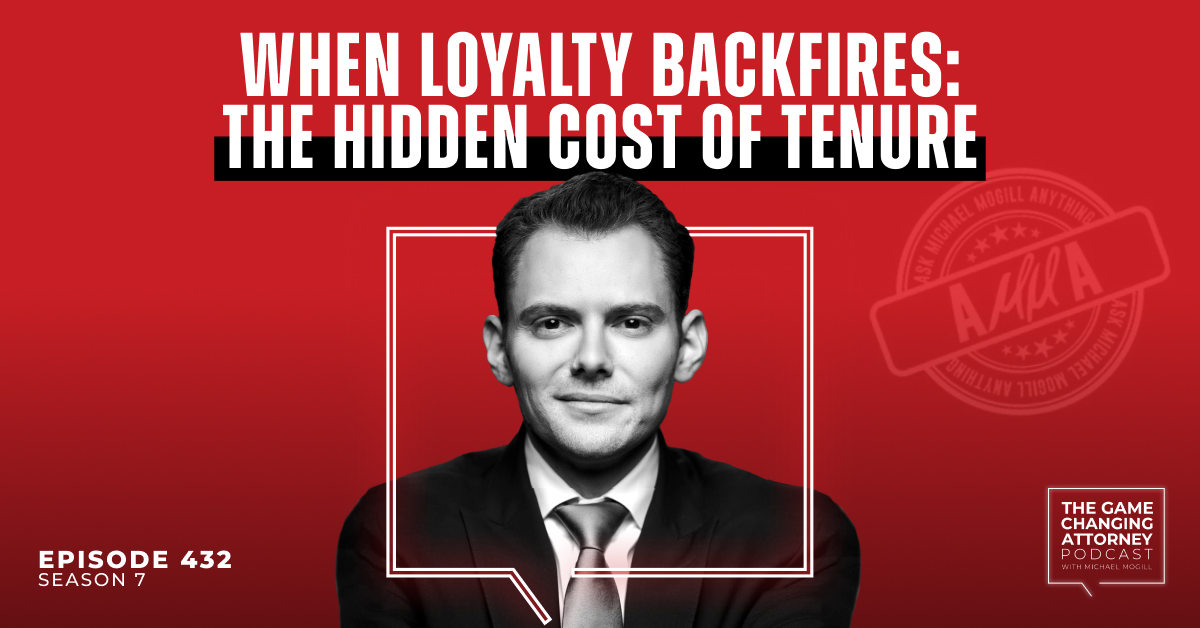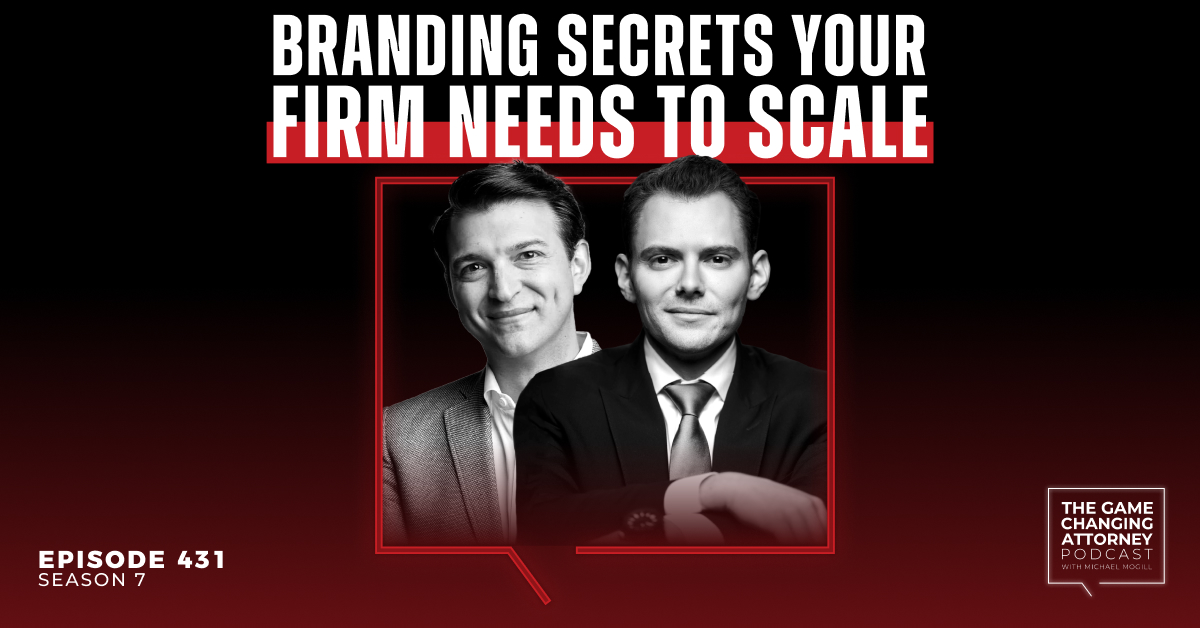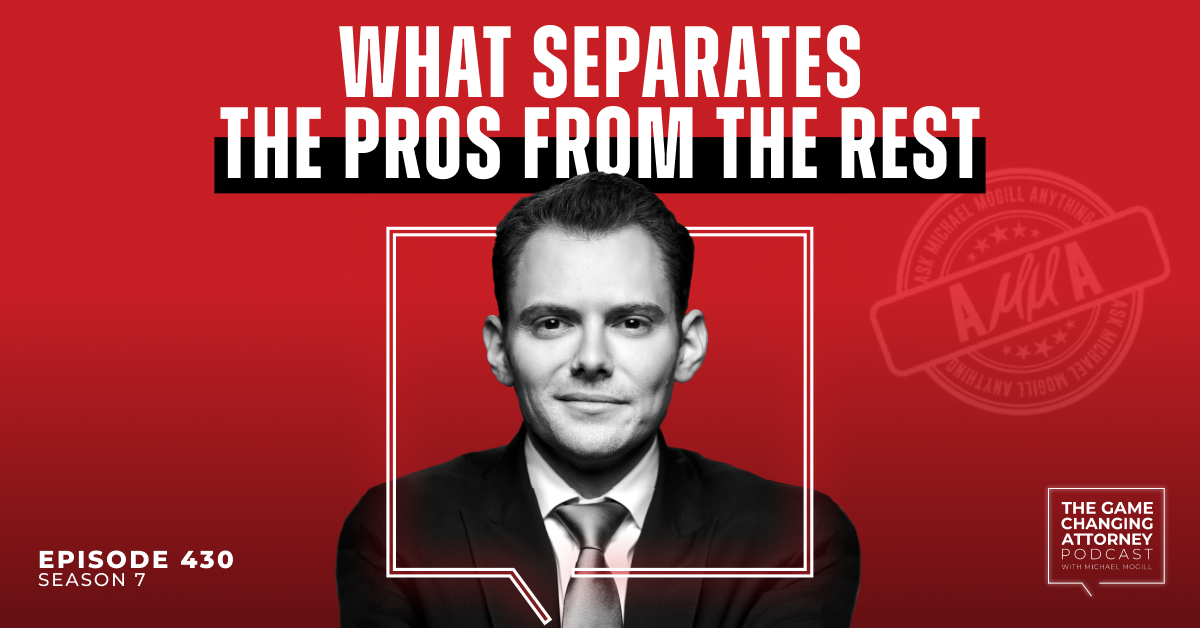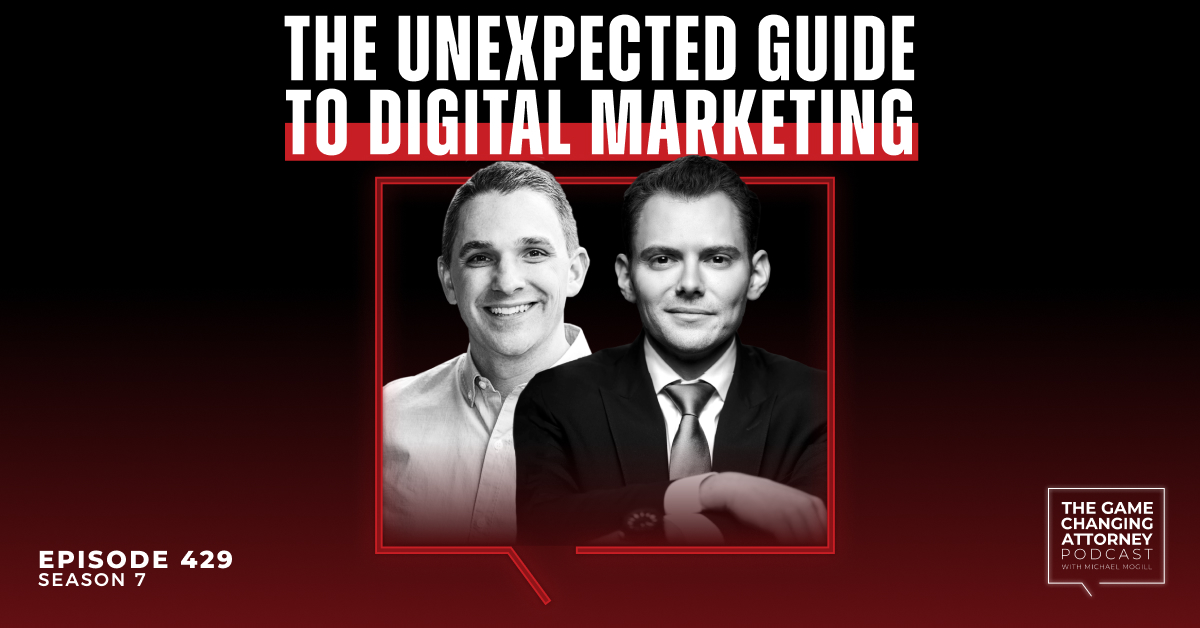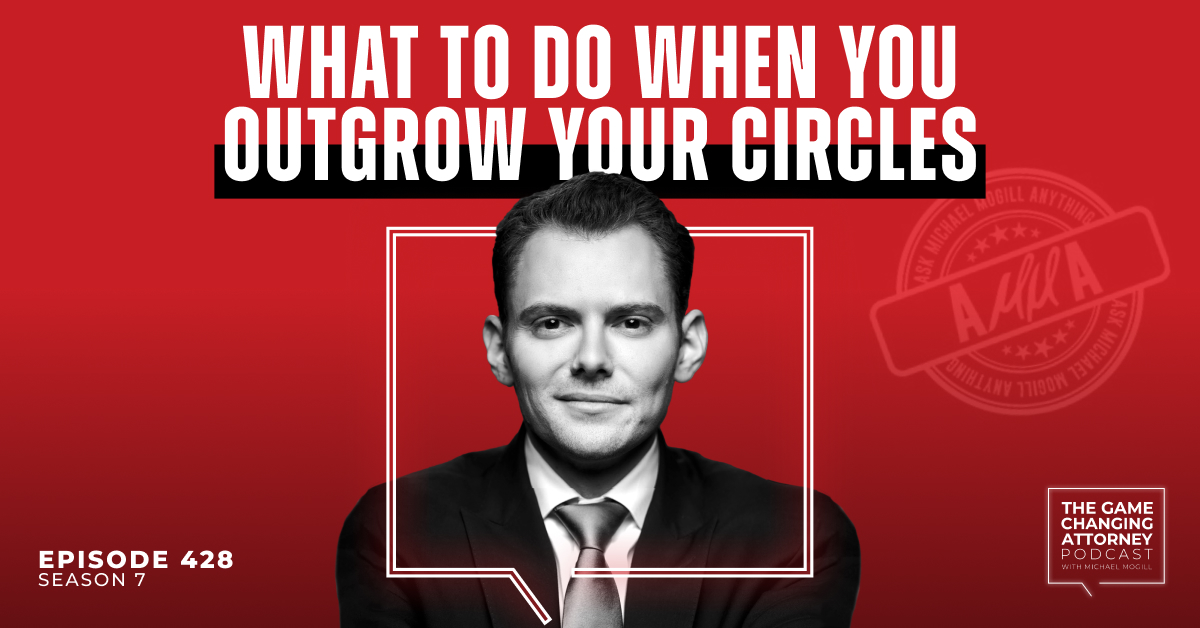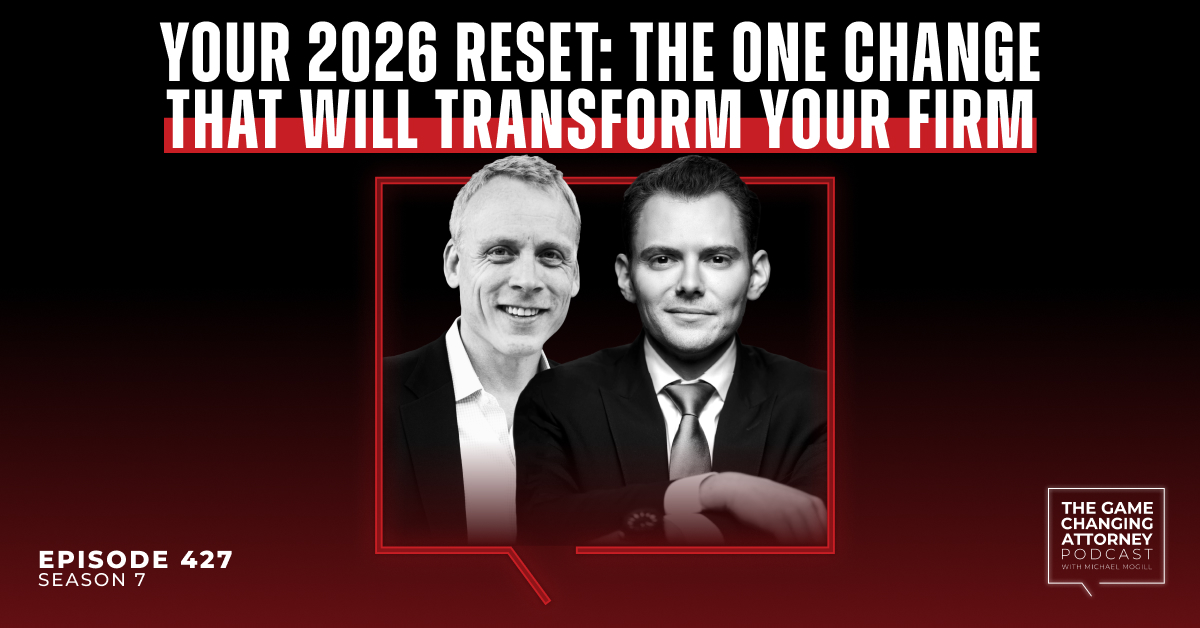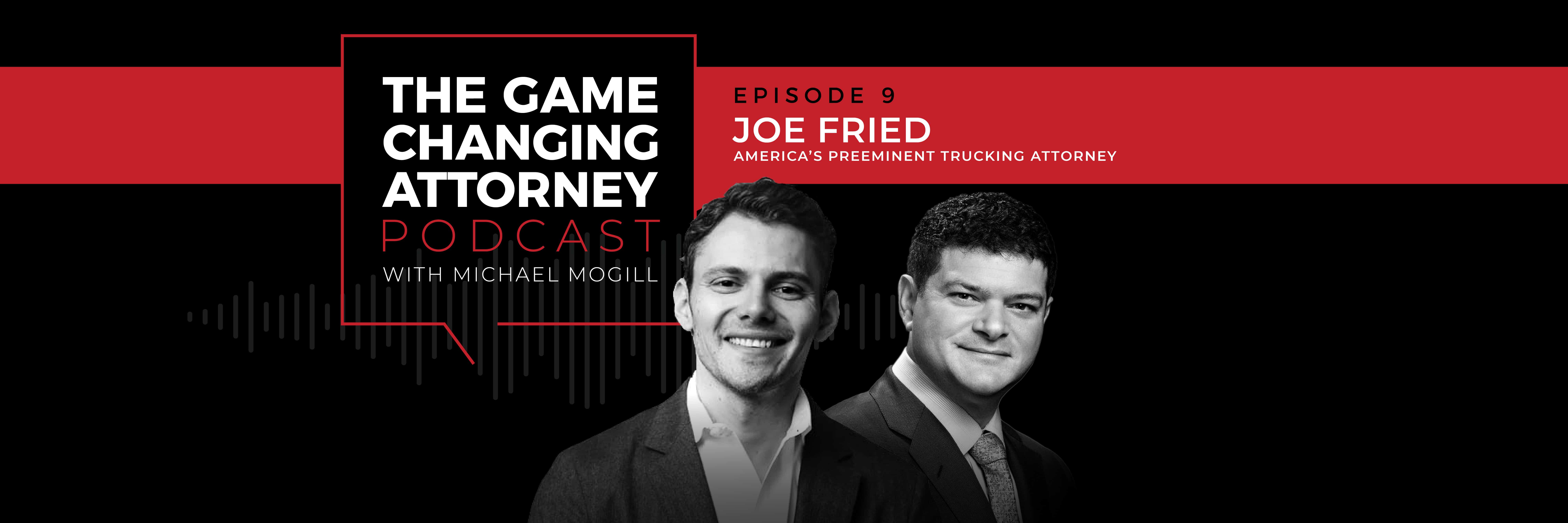
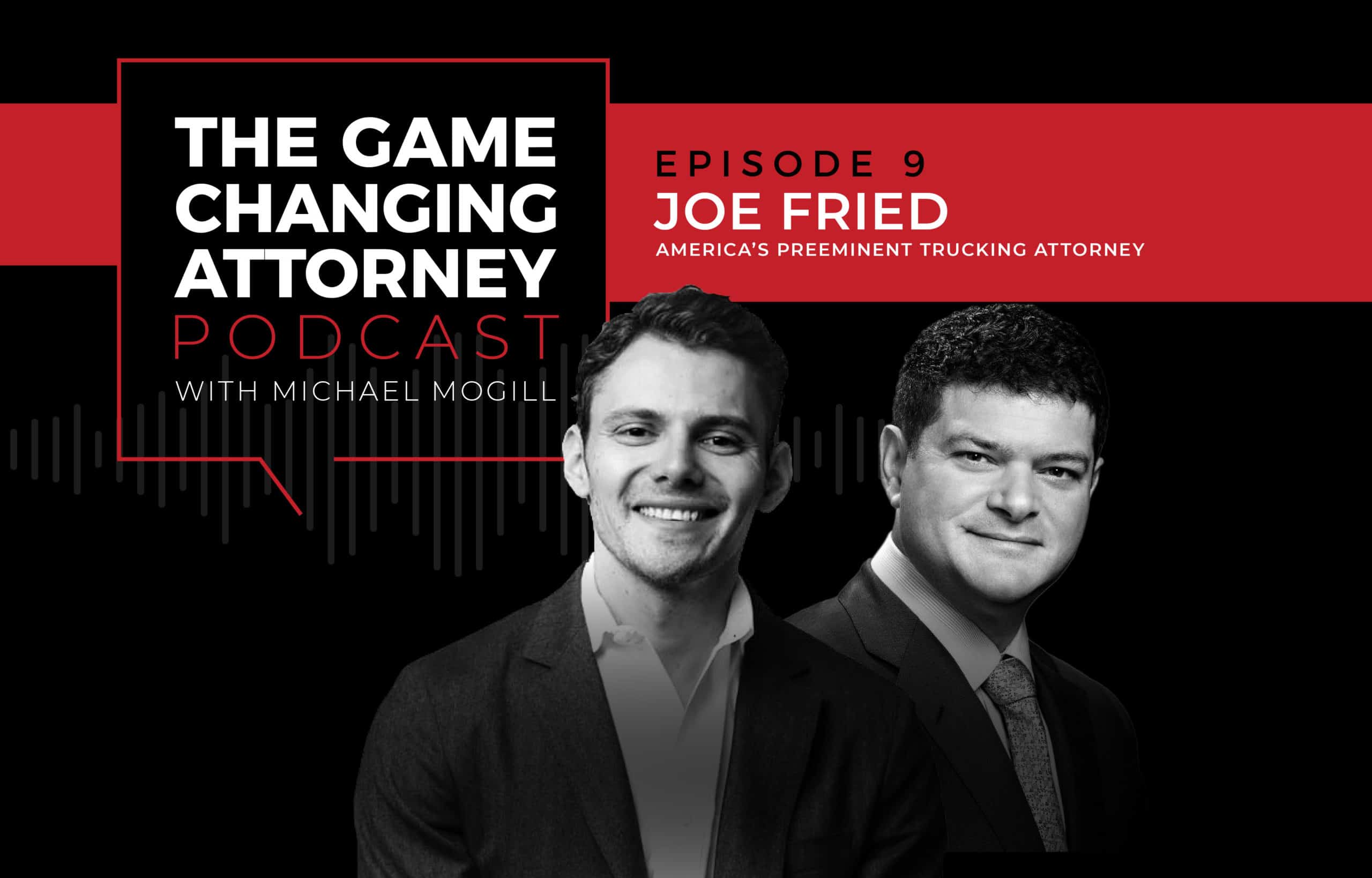
EPISODE 9 — Joe Fried — How to Hyperspecialize & Dominate Your Niche
Joe Fried has been obsessed with justice for as long as he can remember. He started his career as a police officer, where he saw firsthand the impact made on individual lives within the hallowed walls of a courtroom. From there, he continued on to pursue a career in the law. Along the way, Joe discovered a narrow legal niche he cared deeply about…and could impact to a greater degree.
With his passion for personal injury in the trucking niche and his ambition to be the best, Joe has opened up a whole new legal landscape and become a driving force behind lasting change in the trucking industry.
In this episode of The Game Changing Attorney Podcast, Joe and Crisp Founder & CEO Michael Mogill dive deep to discuss:
- Why would an attorney turn down a surefire career to gamble on an unexplored niche?
- How does giving away your expertise to your competitors make you a better lawyer?
- Why is fear the best motivator, and how can you use it to your advantage?
- How do you lead a firm with a hyperspecialized practice area when there’s no playbook?
- and MUCH more…
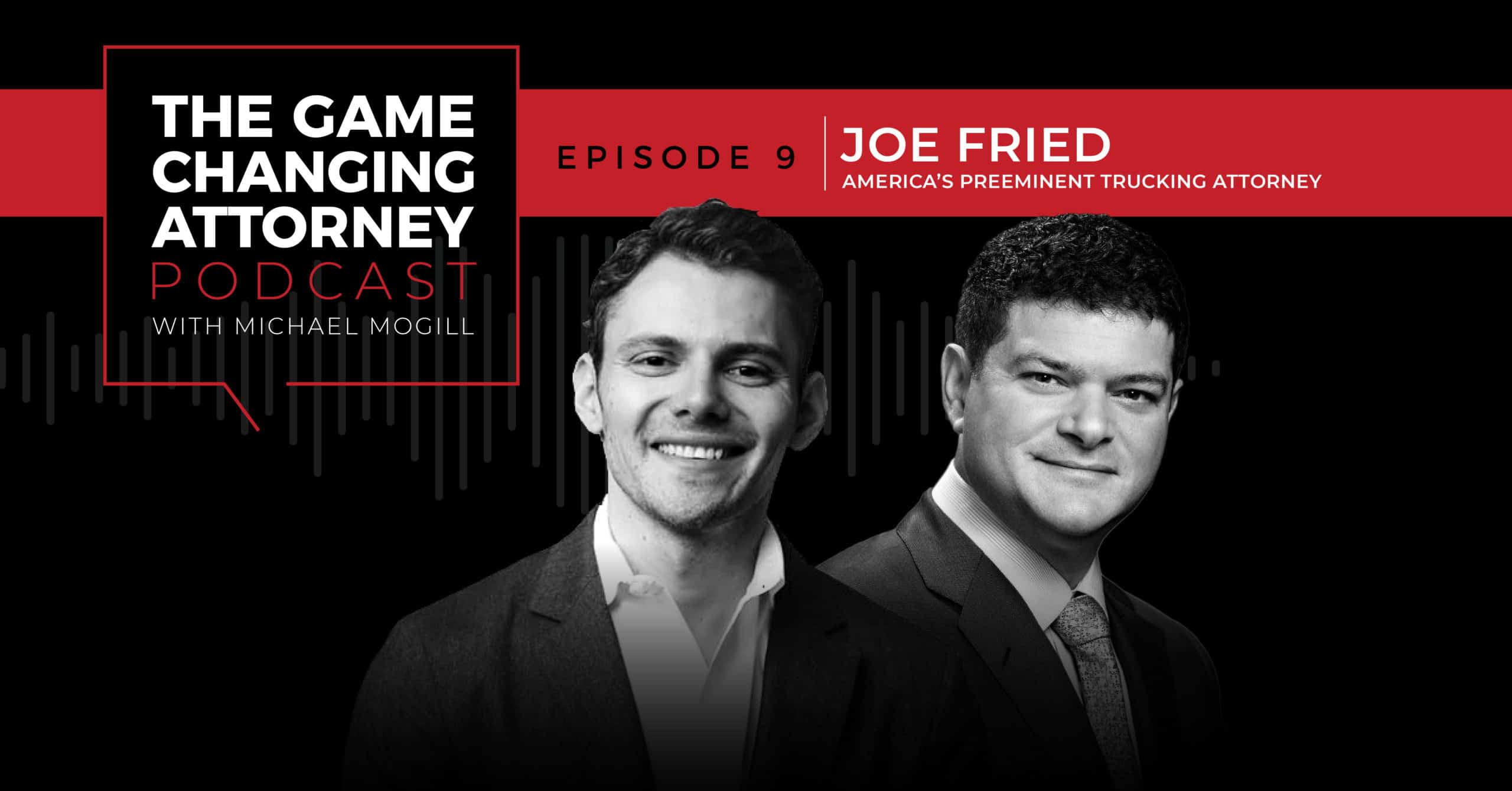
Listen & Subscribe
Show Notes:
1:48 – Looking out for the little guy. “I’m somebody who grew up really hating bullies my whole life. I mean, I didn’t know that’s what I was doing, but I was always somebody who gravitated toward being the guy who would stand up for the little guy, to try to stop whatever was going to happen bad to the little guy, and to try to fix what did happen bad to the little guy.”
3:56 – A place to make a difference. “To me, sitting in a courtroom was like sitting in a hallowed place. I was a police officer starting when I was 19 years old, so I was pretty young. Even even at a very young age, I felt that important things happen here. I also saw with my own two eyes that justice is not equal at all. Justice is not blind at all. And despite our affirmation that it will be, it’s not. And one of the big difference makers is the lawyer. So, I saw that as a place that I should go, a place that I could make a difference.”
8:35 – Finding a niche. “As my practice narrowed in its scope, my geography grew and it truly became national. I was handling cases all over the United States. This little punk from Georgia was handling major fire cases all over the place and working with really great lawyers who, frankly, probably could have done it themselves — but they didn’t want to spend the hundreds and thousands of hours that I spent becoming a subject matter expert.”
10:29 – From fires to trucking. “I was stumbling around looking for what I was going to do next. I knew for me, Joe Fried — I’m not saying this is necessarily the case for everybody — but for me, hyperspecialization was going to happen. I think I could psychoanalyze myself and tell you that one of the reasons I do that is because I don’t know that I could be a subject matter expert in lots of things at the same time. So I chose one, and it took me about a year to focus on trucking itself.”
15:28 – His first trucking case. “This lady with a far-off voice started to talk to me and said, ‘Is this Joe Fried?’ I said, ‘Yes ma’am. Hello. Can I help you?’ And she said, ‘At three o’clock this morning, my husband was killed. I don’t know what happened, but I know that he got hit by a truck.’ I thought, really — I mean, this seems like weird stuff, man. Like, did I cause this? So I asked how she knew to call me, and she said, ‘I don’t really know how I have your name,’ but she called me. I mean, I don’t know if somebody in law enforcement gave her my name. I probably had a website, but it certainly wasn’t a trucking website. And of course, I said, ‘Well, don’t talk to anybody else. I’m on my way to come see you.’ And right about that time my one staff person came in and I said, ‘We’re now a trucking firm.’”
19:33 – Proving their value. “We had to first teach the world that this was a sub-specialty, if you will, that this is not just a marketing ploy to get trucking cases, and that there is enough enough of a difference between handling trucking cases and handling auto cases. The world needed people who were specialists in this area, and while we were doing that, we were branding ourselves into the leadership of that new space, if you will.”
21:53 – All about passion. “The message I try to tell my kids is I really, truly don’t care what you decide to do. My prayer for you — and it’s truly my prayer for them — is that whatever they decide to do, they do it from a place of passion. Then, you know, it’s a lot easier to put those 15-hour days in that it sometimes takes to be successful at it. It’s less of a job and more of a calling, or a ministry, if you will. But, you know, I mentor people all the time, and I help them, whether they tell me they want to be a truck lawyer and be my competitor, or they tell me, they’re just looking for a way to do this. And what I do is — and it sounds like a lot of what you are saying in your book — I help them look for their passion.”
25:51 – What Joe does differently. “We have had a lot of success, and I’m proud of that. So really I’m taking your question as, ‘What do you think is happening differently?’ Part of it is a passion and part of it is a refusal to buy in. I think the limiter for most plaintiffs lawyers when you look at the value of the case is the plaintiffs lawyer themselves. If, God forbid, you ever need a plaintiff’s lawyer, the interview questions that you should ask them is, ‘Tell me what you think about my damages. Not what do you think a jury might do, but tell me what you think,’ because I’ll tell you what, folks, when your lawyer says, ‘I think what a jury will do is X,’ what they’re really telling you is what they think. That’s the truth. It’s one step removed, but it’s easier to say, ‘Well, a jury is not going to like you. A jury is not going to like the fact that you were a drug addict. The jury is not going to like — I think a jury would return a verdict of X.’ That’s really a foil for what the lawyer thinks. I challenge that every single day, and I ask the lawyers I work with to challenge it every day.”
28:47 – Creating a new narrative. “What we are doing is challenging and trying to not buy into what I think is a defense mentality in cases, especially on valuation. The cases that we have most outperformed in are cases that have ‘big problems.’ When you learn how to look at that ‘problem’ and incorporate it and find a way that it really fits into the case, it not only stops being a prompt to the case, but now there’s a new narrative for the case. The case is now about how dare the defense try to play that card to try to avoid the responsibility level that they have in the case? I mean, look at the trick. Look at this, because at the end of the day, that’s what I think juries respond to.”
31:48 – Act like the case is important. “How hard you work the case matters. If you give attention constantly to the case, the case is important not because you say it’s important, but because you act like it’s important — and that drives value. Every lawyer who has any level of experience, who’s listened to this podcast, knows that the cases that are important to them get their attention. The other ones tend to lag behind. You’ve got to push them forward, and hopefully you’ve got a good case management program that’s pushing you forward. But that’s not where your energy goes. So act like the case is important, and the case is important.”
32:49 – An addiction to hard work. “I think that that fear makes us go down different paths, and for some people fear drives them to drugs, alcohol, reclusiveness, and failure. For others, it drives them to be a different kind of addict, one that goes to work every day, on weekends, and spends 15 hours a day — as you look at those things there, it’s an addiction also.”
34:29 – Doing his part. “I see a society that in some ways has devalued life and devalued pain a lot. I refuse to accept that. That is a sense of fear of what we become as a world and as a society. I’m just trying to do my small piece on a case-by-case basis to remind folks — one-by-one and case-by-case — that every human being is valuable. Every human being’s experience is valuable.”
36:58 – A different approach. “I do my best to train my competitors. Every now and then, I catch myself by the throat and say, ‘What the hell are you doing?’ and then I turn right around and say, ‘I’m training my competitors,’ because what’s more important is that we leave this place better than we found it. You know, I think what happens on the defense side is they come up with some new thing or some new idea or whatever, they hoard it, and then they won’t share it, and they think that as soon as they share it, that their value goes down. That’s just not the mentality I have.”
37:23 – A new measure of success. “My measure of success for myself now is helping other people become successful — people that work with me and my firm, my younger partners and associates, my paraprofessionals who have been awesome and now are able to live a better socioeconomic existence because they’ve been with us for a long time, and they’ve helped us succeed and we’ve helped them succeed. But then even beyond and way outside of our firm, I mean, everybody I think who has success owes a debt of gratitude to somebody, and the way you pay that debt of gratitude is to pass on what you’ve learned and build the next generation. This thing may be my internal sense of duty, but it’s one that I think is righteous and correct.”
40:10 – Giving and receiving. “The more I’ve given, the more I’ve gotten. And every time I teach, I learn. It’s this weird dichotomy in the world. The more you give, the more you get. The less you need, the more you get. The more you give it away, the more it comes back to you in spades. That’s true on the financial side, but it’s also very true on almost the spiritual side — the parts that feed your soul.”
47:26 – What does being a game changer mean to you? “Being a game changer means that in each stage and each place that you have in your life, you have the ability to be a game changer — that you are a servant leader. It means that you are bringing up the next generation. It means that you’re living a life. I think at the end, we’re here to live our lives in service of other people. I find that the happiest people in the world are not the richest people. They’re not the ones that the world might call successful from a socioeconomic perspective. They’re the ones who most live that way in service of other folks. So, as you get more resources, it’s easier to do that, but you don’t really need resources in order to do it. That’s what I’m learning a little too late in life.”
EPISODE RESOURCES
Georgia Trial Lawyers Association
Fried Goldberg Seminars
Connect with Michael
- Text directly at 404-531-7691
